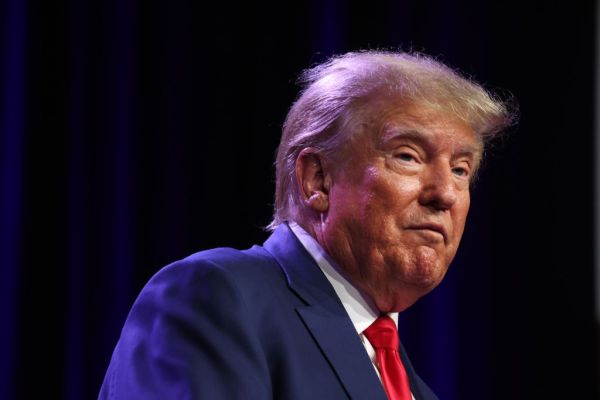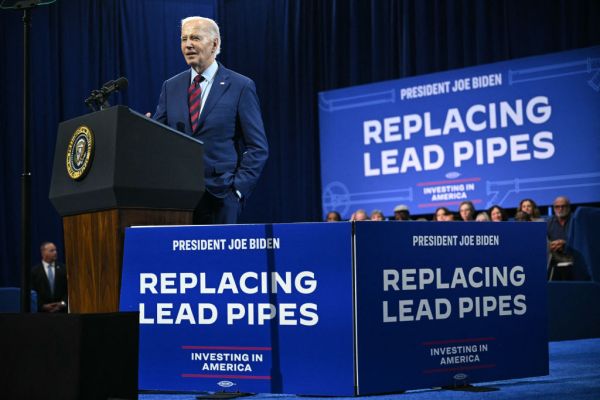In the Republican Party, moral criticism can only properly be leveled against enemies of the grassroots right. Moral criticism of the base or one of its champions, if it’s to be made at all, must be presented as political criticism.
Although Trump is leading the Republican primary by a zillion points, for example, his opponents continue to resist saying that he’s unfit for office. That’s because complaints about character are moral complaints, and only Democrats would make such a complaint against a populist hero. To protect their partisan authenticity, Republican challengers must repackage their criticism of Trump’s unfitness as a political critique instead. A nominee who’s under indictment can’t win. He’s unelectable.
It’s a matter of demonstrating the correct priorities. The modern right treats its supreme (and really only) moral virtue as keeping the left out of power. Impugning Trump on moral grounds challenges that dogma by suggesting America might be better off with a Democrat as president than him. Impugning him on political grounds, on the other hand, is tolerated because it signals that one’s priorities are in line: Because defeating the left is supremely morally important, we must have a nominee—and an agenda—that can actually win.
I was thinking about that on Sunday while watching Trump extinguish what’s left of the pro-life movement during an interview on Meet the Press.
He’s been complaining about pro-lifers all year.
It started on New Year’s Day, while the rest of us were nursing our hangovers. Trump knew Ron DeSantis had a strong electability case against him in the coming presidential primary after MAGA stars like Kari Lake and Herschel Walker performed woefully in last year’s midterms. He was desperate to shift blame for the GOP’s failure, and he found an easy scapegoat in the right’s abortion opponents.
“It was the ‘abortion issue,’ poorly handled by many Republicans, especially those that firmly insisted on No Exceptions, even in the case of Rape, Incest, or Life of the Mother, that lost large numbers of Voters,” Trump wrote on January 1. “Also, the people that pushed so hard, for decades, against abortion, got their wish from the U.S. Supreme Court, & just plain disappeared, not to be seen again.”
Pro-lifers didn’t appreciate that, but Trump wasn’t done. By April, he was lobbying activist leaders to ease off demands for strict abortion bans, warning that the party risked “losing big.” That same month, his campaign spokesman said abortion law should be decided at the state level, infuriating pro-life groups that want federal restrictions to limit the ability of blue states to provide abortion on demand. Susan B. Anthony Pro-Life America responded by declaring that he’d taken “a morally indefensible position for a self-proclaimed pro-life presidential candidate” and vowed to oppose any candidate who wouldn’t, at a minimum, sign a 15-week federal ban into law.
For a brief moment it seemed like the right’s irresistible force, the pro-life movement, might collide with its immovable object, Donald Trump.
But it didn’t. Within weeks, Trump was indicted in Manhattan and his lead over DeSantis ballooned from 15 points to 30. Marjorie Dannenfelser, the leader of the Susan B. Anthony group, promptly met with the new runaway frontrunner and pronounced their conversation “terrific,” seeming to back away from the threat to oppose him in the primary.
Four months later, Trump’s 30-point lead is now 45 points, and his complaints about the pro-life agenda seem to have evolved. Here he was on Meet the Press:
To say that strict abortion restrictions are unpopular and will invite an electoral backlash if pursued at the federal level is to make a political complaint. (An apt one, frankly.) To say that strict state restrictions are “a terrible thing and a terrible mistake” is something rather different.
He’s not just calling the pro-life grassroots right’s agenda politically unworkable here. He’s suggesting that a six-week ban of the sort enacted by Republicans in Florida, Georgia, and Ohio is indefensible on the merits—a moral complaint. Or as close to a moral complaint as Donald J. Trump is capable of making.
If this party nominates a candidate who opposes doing precisely what overturning Roe was supposed to achieve, what’s left of the pro-life movement?
“The pro-life movement is fine,” you might say, pointing to the outcry at Trump’s Meet the Press comments from parts of the right.
It’s true, individual anti-abortion opponents did complain. Some were political movers and shakers, others were conservative media influencers, many were rank-and-file DeSantis fans. National Review published a quick editorial denouncing Trump’s comments as “terrible.” One notably harsh critic was Lila Rose, the president and founder of the pro-life group LiveAction:
Missing, though, from this group of righteous critics are people who had intended to support Trump for president but who’ve changed their minds because of what he said about Florida’s ban. Rose has opposed him for months because of his “quite frankly disgusting” post on January 1. National Review wrote off his 2024 candidacy in an editorial last November. DeSantis fans were already eager to move on to new leadership.
Among all of them there’s a sense of desperate hope that perhaps this will be the thing that at last rouses the right-wing base from its moral and ideological torpor and sends them rallying behind the governor of Florida, the man who signed the six-week ban into law that Trump seems to find so troubling.
Time will tell, but the most ardent MAGA influencers seemed unperturbed this weekend by Trump’s latest comments. The logic of those people may sound familiar: We should refrain from attacking Trump on moral grounds and focus instead on the supreme virtue of denying the left power.
The Republican ranks in Congress are filled with ostensibly pro-life Christians, yet as I write this on Monday I’m not aware of a single one who’s piped up to protest Trump’s Florida comments. “If you dislike the religious right, wait till you meet the post-religious right,” Ross Douthat said presciently in February 2016 as Trump began piling up early primary victories. Here we are. How do you like it?
The fact that the leader of the Republican Party has become, shall we say, anti-anti-choice won’t persuade committed pro-life voters to abandon their beliefs. I doubt it’ll do much to influence even “soft” pro-lifers in the near term. In that sense, the “pro-life movement” really is fine. But what Trump’s leadership might do is set a standard by which being anti-anti-choice is no longer disqualifying in a Republican primary—at least if a candidate’s populist credentials are otherwise solid.
Abortion might go from a litmus-test issue to what we might call a “plus” issue. If a candidate is staunchly anti-abortion, great. That’s a plus. If he isn’t, whether abortion should be used as a cudgel against him may depend on how much of a squish he is on policy generally. For, say, Mehmet Oz to be lukewarm about “heartbeat bills” is disqualifying. A populist stalwart would likely get a pass. And Trump? He gets carte blanche.
As always, the politics of the Trumpist base change as his political needs require.
There are major consequences at stake here, for the party and for the pro-life movement.
Imagine that Trump were to win next year’s Iowa caucus. It isn’t hard: He’s nearly tripling Ron DeSantis’ support there in public polling, and he’s boosting his presence in the state in the hopes of locking up the nomination early. The last three Republican winners of the caucus during competitive cycles—Mike Huckabee, Rick Santorum, and Ted Cruz—were outspoken Christians and social conservatives who relied on the evangelical vote to put them over the top. What would it say about the influence of those evangelical voters if Trump, after denouncing Florida’s six-week abortion ban as a “terrible thing,” ended up crushing the man who signed that ban into law?
At a minimum, such a result would seem to indicate that his cult of personality now commands more loyalty within the party than the pro-life cause, which has been championed as an urgent moral necessity by the American right for the past 50 years. But a Trump victory in Iowa might also teach the former president and his many populist emulators that holding a centrist position on abortion is no longer a political liability. If anything, it’s an advantage: A Republican who enters the general election with a reputation for moderation on abortion will have less to fear from the post-Dobbs backlash than a figure like DeSantis, who’s latched himself to a six-week state ban.
Meanwhile, Trump’s influence over the Republican rank-and-file is such that his opinion on abortion could create a “permission structure” that begins to meaningfully, if gradually, shift right-wing views on the merits. If Trump defeats DeSantis in Iowa it’ll probably be in spite of his anti-anti-choice views, not because of them. It might not be long before Republican voters come to view abortion policy as something like funding Ukraine, a matter where there’s enough of a difference of opinion within the party that they’re free to go their own way. National Review’s John McCormack peers into the future of state abortion ballot initiatives and worries:
When the voters of Michigan were given the choice between the state’s pre-Roe law, which contained an exception only for the life of the mother, and a sweeping pro-abortion constitutional amendment, the amendment passed with 56.7 percent of the vote. Trump’s attack on Florida’s heartbeat law could put the state’s pro-abortion amendment over the top, and the consequences of its passage would be deadly.
Even if the pro-abortion measure fails to get 60 percent in Florida, Trump is doing real and deadly damage to the pro-life cause. Many partisans derive their positions from whatever their political leaders say, and this has been especially true of the cult of personality that has been built up around Trump.
Trump utterly transformed white evangelicals’ view of whether politicians who behave immorally in their personal lives are fit for public office. Why would anyone doubt at this late date that he might also transform their view of abortion policy as a top priority in elections?
A Trump victory in Iowa would also hold hard lessons for the institutional pro-life movement, groups like LiveAction and Susan B. Anthony Pro-Life America. If those organizations spend money in the state and throw their weight around politically to try to propel DeSantis to victory, they risk two bad outcomes. One is that DeSantis wins with their help, at which point Trump and his fanatic base come to regard them as mortal enemies. If Trump then goes on to defeat DeSantis for the nomination anyway, those groups might find themselves given the cold shoulder.
If DeSantis loses with their help, it’s a double whammy. Not only will pro-lifers have annoyed the winner by opposing him, they’ll have proved in the starkest possible way that they’re no longer a force in Republican politics. They’re already at risk of being seen as a paper tiger given the results of recent abortion ballot referendums in states like Ohio and Michigan, notes Semafor’s Benjy Sarlin. For pro-life groups to start losing Republican primaries—especially on turf as favorable as evangelical Iowa—would be catastrophic.
It would be the end of the pro-life movement, at least as an institutional entity worth taking terribly seriously.
The end may already have arrived.
When Marjorie Dannenfelser was asked by reporters on Monday what she thought of Trump calling Florida’s ban “terrible,” she couldn’t bring herself to condemn him. She couldn’t even bring herself to make the case for six-week bans on the merits (although she did thank DeSantis for signing the Florida bill into law). All she was willing to do was reiterate her group’s support for a 15-week federal ban—a restriction so lax that it would permit well over 90 percent of abortions.
That’s the end of Pro-Life Inc., just as it was the end of so many other strains of conservative activism. Given a choice between a principled but almost certainly futile effort to defeat Trump for betraying her cause or piping down and adapting herself to his agenda in order to maintain a simulacrum of influence, Dannenfelser has seemingly chosen to play ball. Fiscal conservatives did the same in accommodating themselves to Trump’s spending policies, as did many War on Terror hawks who accommodated themselves to Trump’s allergy to “endless wars.”
The thing about Faustian bargains is that there’s no such thing as a partial deal. The devil may take your soul piece by piece rather than all at once, but he’ll take it all eventually. DeSantis did what conservative critics of Roe hoped Republican governors would do once that decision was overturned. Trump held it against him, and it looks as though Susan B. Anthony Pro-Life America and many millions of ostensibly “pro-life” Republican voters will choose to be no more than neutral between the two.
As my colleague Andrew Egger noted today, groups like Dannenfelser’s ostensibly exist to support laws like Florida’s. If they’re unwilling to do that when their mission conflicts with Donald Trump’s political priorities, they simply should not exist.
Another way you can tell that this is the end of the pro-life movement is that Trump plainly doesn’t care about any of this and never has. He’s not even sure whether to take credit for state abortion restrictions or to denounce them. The pro-life movement isn’t ending because it’s lost an ideological death struggle with a committed pro-choice activist. It’s ending because he needs it to go away lest it complicate his reelection bid and, to all appearances, some of its most influential players are willing to oblige.
“He hasn’t given the matter a moment’s thought. What he has doubtless thought about is the short-term politics of his new position,” National Review’s editors correctly wrote on Sunday of Trump’s anti-anti-choice awakening. During the Meet the Press interview, Trump resisted saying what sort of restrictions he’d support—or even whether he prefers federal or state action. He’ll broker a compromise on legal abortion, he vowed, refusing to commit to anything specific. One wonders why he doesn’t simply join with Democrats in Congress in moving to codify Roe: If it’s a compromise he wants, but strict restrictions are off the table, “viability” seems like a fine starting point.
I gave you Dobbs, he might remind his pro-life detractors when challenged on all of this, hoping to shut them up. But Dobbs is worthless without legislative action to limit abortion, the very thing he finds “terrible” in Florida. Overturning Roe is George W. Bush standing on the aircraft deck with a “mission accomplished” banner behind him. It’s what happens next, not what came before, that will decide whether the war was won or lost.
All Trump knows or cares about abortion is that the pro-life position has done badly with general election voters over the past year and that his chief rival for the nomination, a younger man whom he despises for his “disloyalty,” has gotten to his right on it. He doesn’t need any grander reasons to formulate a view on the issue post-Dobbs. He was pro-life in 2016 because it helped him through the primary; he’ll be anti-anti-choice in 2024 because that will help him to the presidency. All contentious questions are forever resolved in favor of the position that most redounds to Donald Trump’s personal benefit.
Perhaps the much diminished pro-life movement will still retain some influence in state-level Republican primaries, which is where most of the action on abortion policy will be going forward. Or perhaps not, as there’s no reason to think the endorsement of Dannenfelser’s group, say, would prevail in a gubernatorial contest if Trump’s endorsement went a different way. Maybe pro-lifers will be expected to stand down in those contests too lest they complicate the political fortunes of some new MAGA heartthrob who sees advantage in moderation on abortion.
By declining to oppose Trump now, though, they’re clearing the way for a general election in which the Republican nominee will not only disappoint them on their pet issue—he’ll subordinate it to chatter about rigged elections and “deep state” indictments of the utmost inanity. The pro-life movement got what it wanted from its Faustian bargain when Roe was overturned. Now it’s time to pay up.








